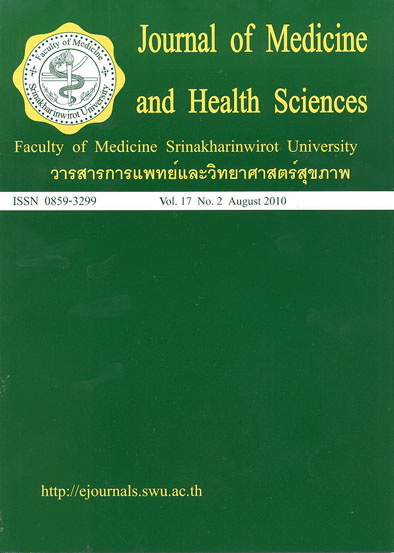Non-steroidal antiinflammatory drugs (NSAIDs) (ยาลดการอักเสบที่ไม่ใช่เสตียรอยด์)
Keywords:
Prostaglandins, cyclooxygenase, ischemic heart disease, strokeAbstract
NSAIDs are approved for the relief of acute pain and symptoms of chronic inflammatory conditions such as osteoarthritis and rheumatoid arthritis. The mechanism of action of NSAIDs is attributed to the inhibition of cyclooxygenase (COX), an enzyme that convert arachidonic acid to prostaglandins.COX exist in two isoforms,including constitutional COX-1 and inducible COX-2. Inflammatory prostaglandins are primarily derived from COX-2, while prostaglandins formed by COX-1 have in general a more homeostatic role.The anti-inflammatory and analgesic efficacies are thought to be mainly due to inhibition of the inducible COX-2, whereas the adverse effects seem to be caused by inhibition of constitutional COX-1,resulting in the development of COX-2 inhibitors (selective and specific COX-2 inhibitors). All COX-2 inhibitors have comparable efficacy to traditional NSAIDs but provide a slightly better gastrointestinal safety profile. However COX-2 inhibitors carry some potential cardiovascular risks, particularly when taking at high doses for prolonged periods of time.Therefore, the cardiovascular risks and gastrointestinal benefits of COX-2 inhibitors must be carefully weighed before making therapeutic decisions.Downloads
How to Cite
1.
Korsuntirat T. Non-steroidal antiinflammatory drugs (NSAIDs) (ยาลดการอักเสบที่ไม่ใช่เสตียรอยด์). J Med Health Sci [internet]. 2011 Feb. 2 [cited 2026 Feb. 25];17(2):97-112. available from: https://he01.tci-thaijo.org/index.php/jmhs/article/view/61244
Issue
Section
Review article (บทความวิชาการ)



